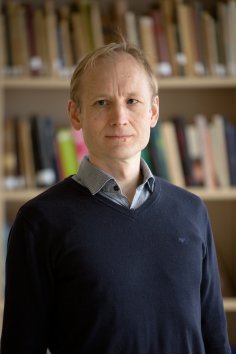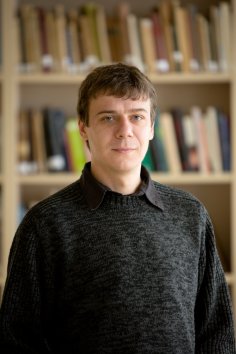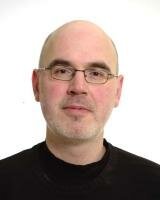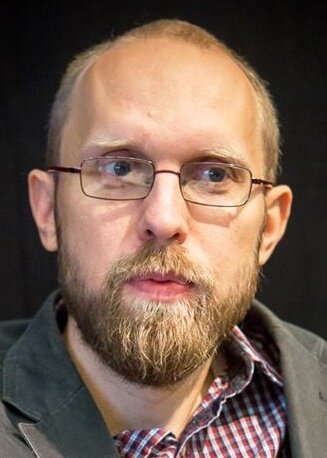Chair of Intellectual History
|
Image

|
Pärtel Piirimäe Areas of specialisation: European and Estonian intellectual history, Early Modern political and moral thought, the history of international law and natural law, development of early modern state, history of historiography, the formation of regional identities E-mail: partel.piirimae@ut.ee |
I joined the Department of Philosophy in 2018 as the Professor of Intellectual History. After the completion of my Ph.D. in History at the University of Cambridge (2007) and working as a Research Fellow at St. John’s College, Cambridge, I started and continue to work as a Senior Researcher and Associate Professor in the History of Ideas at the Institute of History and Archaeology, University of Tartu. I have also been a Pro Futura Scientia Fellow at the Swedish Collegium for Advanced Study in Uppsala (2013-2017), and Visiting Scholar at the Minda Gunzburg Institute of European Studies, University of Harvard (2016-2017).
My areas of research are:
- Early modern political and moral philosophy
- History of international political thought
- Propaganda, polemics, and official historiography in early modern Europe and the Baltic Sea region
- The Estonian and Baltic intellectual history in the European context
I teach courses in the history of European ideas, history of international thought, history of natural law and the history of Estonian political and social thought
I have published a number of newspaper articles and participated in popular science programmes on the national television and radio. I have organized and participated in the debates at the Opinion Festival (Arvamusfestival).
"Breaking the Ground for Reorganisation. Politico-economic Reason and Advocacy for Change in the Early Modern Baltic Region“ (PRG318, 2019-2023, PI Marten Seppel). The aim of the project is to examine how ideas concerning reorganisation of the state or economy emerged and evolved in early modern Europe. The principal questions are: how did novel ideas spread, how they were modified and translated locally, who actually were the trailblazers? The project limits itself mainly to the early modern Baltic region (i.e. Sweden and Russia together with their Baltic provinces) but comparisons will be drawn with England and other parts of Europe. By shifting our attention to Northern (and Eastern) Europe the project aims to orient itself to the regions that were before 1800 also characterised by the discourse of improvement. The outcome will be a better understanding of the complex social, political and economic processes that generate a ‘need’ for change, and how arguments and innovations are then designed to address these ‘needs’. This also helps to explain the divergence and convergence in the development of the European regions. // Centre of Excellence in Estonian Studies (CEES) project (SHVHV16145T, 2016-2023, PI Mare Kõiva). The Centre brings together 15 research groups with more than 60 researchers in addition to more than 50 post-graduate students from the Estonian Literary Museum, the University of Tartu (from the sphere of the humanities and arts as well as from the natural and exact sciences), the Institute of the Estonian Language, Tallinn University, the Estonian Academy of Music and Theatre, and the Institute of Cybernetics at the Tallinn University of Technology. The Centre studies the linguistic and cultural dimensions of Estonia and Estonian identity, both from a historical and contemporary perspective.
I defended my doctoral thesis on 13th century Aristotelianism and moral theology at the University of Tartu in 2008. I have been a Lichtenberg-Kolleg Fellow at the University of Göttingen (2014-2015), researching religious tolerance in the early modern period, and a Pro Futura Scientia Fellow at the Swedish Collegium for Advanced Study in Uppsala (2015–2020). I am currently Associate Professor of Intellectual History at the Tartu University Library and in the University of Tartu.
My main research topics are History of Philosophy and Theology during early modern period. I am especially interested in the university disputations of the Baltic Sea region. Disputations were a kind of formalized method of debate that was used to uncover and establish truths in theology and in the sciences back in the middle ages and early modern period. They are fantastic window onto the thinking and the arguments of the that period in the Baltic Sea region. I have also published articles on the history of the book, as well as some fiction.
I teach courses on the History of European religious thought, the History of alchemy and the History of Estonian philosophy. I also teach creative writing and a course on digital humanities.
Fiction is a way of engaging wider and non-academic audiences. I have published novels, a play and various short stories that discuss and engage with the history of philosphy and theology, as well as wider intellectual histoy. I also publish essays and book reviews. My debut novel "The Golden Age" (published in 2005) won third prize in the 2004 Estonian Writers' Union novel competition. My second novel "The Willow King" (published in 2012) won the 2013 European Union Prize for Literature and has been translated into Albanian (2017), Bulgarian (2018), Danish (2018), English (2017), Dutch (2015), Italian (2015), Croatian (2018), Latvian (2015) , Lithuanian (2020), Macedonian (2018), Norwegian (2016), Serbian (2018), Czech (2016) and Hungarian (2016).
Doctrines, theories and Social Networks in doctors' disputations from the Early Modern Baltics (University of Tartu internal grant).
Robert Seidel, Hanspeter Marti, ja Meelis Friedenthal, toim, Early Modern Disputations and Dissertations in an Interdisciplinary and European Context, Intersections : interdisciplinary studies in early modern culture (Leiden: BRILL, 2020), https://doi.org/10.1163/9789004436206.
Meelis Friedenthal, „Ramism, metaphysics and pneumatology in the Swedish universities of the first half of the 17th century“, Early Modern Disputations and Dissertations in an Interdisciplinary and European Context, toim Robert Seidel, Hanspeter Marti, ja Meelis Friedenthal, Intersections : interdisciplinary studies in early modern culture (Leiden: BRILL, 2020), 625–48, https://doi.org/10.1163/9789004436206_025.
Meelis Friedenthal, „Nominal Definition in the Seventeenth-Century University Disputations of the German Cultural Space“, History of Universities. Volume XXIX / 1, toim Mordechai Feingold (Oxford: Oxford University Press, 2016), 65–87, http://www.oxfordscholarship.com/view/10.1093/acprof:oso/9780198779919.001.0001/acprof-9780198779919-chapter-3.
Natural Law 1625-1850. An International Research Project (Halle/Erfurt). The project is focussed on natural law as an academic institution in the period from 1625 to 1850. The aim of the project is to combine traditional approaches to natural law as a set of ideas with a comprehensive history of academic reception, transmission, and uses that takes into account institutional, political, and legal contexts. To achieve this aim the project attends not only to the published record of natural law – its textbooks and treatises – but also to a natural-law commentaries and pedagogical programs. To this end, the project includes the digitization of these materials for subsequent analysis using methods from the digital humanities. See here for more information.
Baltic Sea disputations network.
|
Image

|
Jaanus Sooväli Area of specialisation: History of Philosophy, History of Estonian Thought, 20th-Century Philosophy E-mail: jaanus.soovali@ut.ee |
I have studied and lectured in Germany (University of Greifswald, 2010-2011), Switzerland (Basel, 2014-2015) and Portugal (on multiple occasions). I defended my PhD at the University of Tartu on different conceptions of decision in 2013.
My research focuses on 19th and 20th Century German and French philosophy with an emphasis on F. Nietzsche’s philosophy and its influence.
I regularly teach courses on French philosophy, German philosophy, Existentialism and Estonian Intellectual History.
I have published a number of reviews and popular articles in the newspapers.
Centre of Excellence in Estonian Studies (CEES) project (SHVHV16145T, 2016-2023, PI Mare Kõiva). The Centre brings together 15 research groups with more than 60 researchers in addition to more than 50 post-graduate students from the Estonian Literary Museum, the University of Tartu (from the sphere of the humanities and arts as well as from the natural and exact sciences), the Institute of the Estonian Language, Tallinn University, the Estonian Academy of Music and Theatre, and the Institute of Cybernetics at the Tallinn University of Technology. The Centre studies the linguistic and cultural dimensions of Estonia and Estonian identity, both from a historical and contemporary perspective.
Sooväli, Jaanus (2020). Christianity and the Fate of Intellectual Conscience. In: Helmut Heit und Andreas Urs Sommer (Ed.). Nietzsche und die Reformation (189−202). Berlin/Munich/Boston: De Gruyter. DOI: 10.1515/9783110587005-014.
I am consultant for the Nietzsche International Lab (NIL) in Lisbon (http://www.hunter.cuny.edu/jns/research/nietzsche-international-lab-nil…).
|
Image

|
Eduard Parhomenko Area of specialisation: History of philosophy, classical German philosophy, phenomenology E-mail: eduard.parhomenko@ut.ee |
I have worked at the University of Tartu in various roles over the years. I studied History at the University of Tartu (1993-1999) and Philosophy at the Graduate College „Phänomenologie und Hermeneutik“ of the University of Bochum and the University of Wuppertal (1996–1999). I'm currently working on my PhD project about the early reception of Kantian philosophy in Estonia.
My main reseach topics are Classical German Philosophy, especially Kant and Friedrich Heinrich Jacobi (popularizer of nihilism, and critic of Kant), the reception of early Kantianism in Estonia; phenomenological philosophy (Husserl, Heidegger, Merleau-Ponty, Henry); aesthetics (Kant, phenomenological philosophy of art); intellectual history in 19th and 20th century Estonia; Soviet philosophy.
I teach courses in Kant´s aesthetics and moral philosophy, phenomenology, Estonian philosophy and Estonian intellectual history.
I have published articles for a non-academic audience on Heidegger (for example, "From Death and Heidegger to the gods", in Postimees 2008 (an Estonian daily newspaper)) and "Granting the poetic and creative enforcement" in the journal of the Estonian writers' union "Looming" (Creation) 2007).



